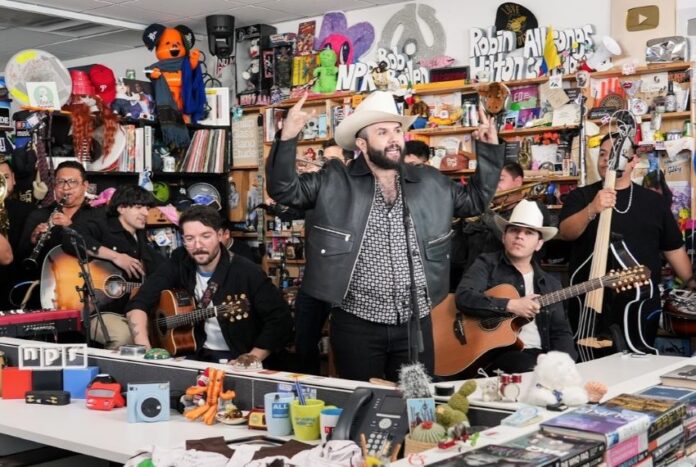Regional Mexican music’s global resurgence took center stage when stars Carín León and Grupo Frontera delivered standout performances on NPR’s Tiny Desk Concert series in recent weeks, highlighting the genre’s emotional depth and cross-cultural appeal.
León, backed by a 16-piece band, performed May 16 in the NPR Music office in Washington, D.C. — severely testing the cramped spaces of the celebrated venue. A video of the performance on YouTube has garnered 3.8 million views in under two weeks.
Grupo Frontera, a Texas-formed band deeply rooted in Mexican genres and cumbia, performed there April 24. A video of that session has over 2 million views.
Both artists were winners at the 2024 Latin Grammy Awards six months ago.
The singer-songwriter León — who hails from Hermosillo, Sonora — won for best contemporary Mexican music album (“Boca Chueca, Vol. 1”).
Grupo Frontera — whose members have roots tracing back to Mexican states like Tamaulipas and Nuevo León — won for best regional Mexican song (“El Amor de Su Vida”) and best norteño album (“El Comienzo”).
Like all Tiny Desk concerts, both performances took place behind a real working desk — originally that of now-retired NPR music host Bob Boilen — surrounded by shelves cluttered with books, memorabilia and office supplies.
The intimate, authentic series has become a viral gateway for artists like T-Pain and Dua Lipa, with 138 million views for Lipa’s 2020 session — although hers was recorded in a London studio as a “home concert,” a Tiny Desk format adopted due to the COVID-19 pandemic.
For Mexican acts such as the soul-stirring Natalie Lafourcade — whose 2017 Tiny Desk Concert is the 13th most-watched of all-time, with 35 million views — and the poetic Silvana Estrada — whose 2021 Tiny Desk (Home) Concert was performed in her childhood home in Coatepec, Veracruz — it’s a platform to transcend stereotypes.
“We’re in a moment where you can be who you are, without U.S. labels dictating terms,” said NPR producer Anamaría Sayre, who champions Latin music.
Blending norteño, banda and pop influences, León played a 15-minute set that included “Ese Vato No Te Queda,” “Lado Frágil” and the then-unreleased ballad “Por La Suave” from his new album, Palabra De To’s (Seca).
“Thank you for having us here. Que viva la música mexicana,” León told the audience, which usually totals about 20 to 30 NPR staffers and guests. “Representing Mexico with our sound is a pride beyond words.”

The performance featured charchetas (brass alto horns that are staples in Mexican music) and a tololoche (a traditional Mexican four-stringed instrument, similar to a small upright bass), plus other instruments emblematic of regional Mexican music’s rich sound.
Three weeks earlier, Grupo Frontera’s seven musicians (two more than usual), one lead singer and three specially added female backup singers brought the band’s “cumbia norteña” fusion to the space.
Playing a month after joining Shakira on-stage in Mexico City, Grupo Frontera performed a 20-minute set that included hits like “Un x100to” and “El Amor de Su Vida” reworked with R&B and reggae twists.
“We rehearsed for days to perfect this acoustic set,” the band noted. Many Tiny Desk invitees opt to play acoustically to match the setting. “The intimate atmosphere made us nervous, but it was truly beautiful.”
The performances also countered criticism of regional Mexican music’s ties to narcocorridos, banned in parts of Mexico for glorifying drug cartels.
“This is about heartbreak, love and pride — not controversy,” NPR’s Sayre emphasized.
Grupo Frontera’s session faced added scrutiny due to what has been perceived as past praise for U.S. President Donald Trump. Their Tiny Desk show was decorated with a Mexican flag and sombreros.
